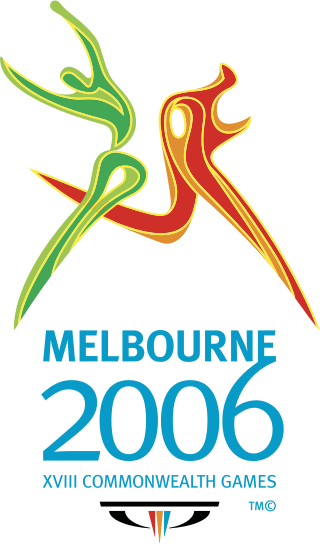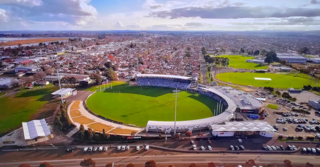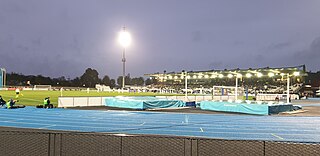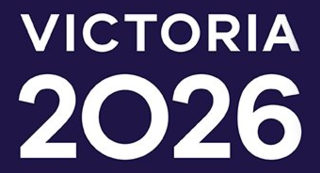Related Research Articles

The 2006 Commonwealth Games, officially the XVIII Commonwealth Games and commonly known as Melbourne 2006, were an international multi-sport event for members of the Commonwealth held in Melbourne, Australia between 15 and 26 March 2006. It was the fourth time Australia had hosted the Commonwealth Games. It was also the largest sporting event to be staged in Melbourne, eclipsing the 1956 Summer Olympics in terms of the number of teams competing, athletes competing, and events being held.

Western Highway is a major arterial route in western Victoria with a length of approximately 258 kilometres (160 mi) of single carriageway, then 161 kilometres (100 mi) of dual carriageway known as Western Freeway, linking the western suburbs of Melbourne to the border with South Australia at Serviceton. It is the Victorian part of the principal route linking the Australian cities of Melbourne and Adelaide, and is a part of the National Highway network, designated routes A8 and M8. The western end continues into South Australia as Dukes Highway, the next section of the Melbourne–Adelaide National Highway.

Goulburn Valley Highway is a highway located in Victoria, Australia, linking Tocumwal on the Murray River through North Central Victoria to Eildon. The section north of the Hume Freeway is part of the Melbourne to Brisbane National Highway and is the main link between these two cities, as well as a major link between Victoria and inland New South Wales. It is also the most direct route between Melbourne and the major regional centre of Shepparton in Victoria.

Sport is an important part of Australian culture and dates back to the early colonial period. The first of the country's mainstream sports to become established in order of their organisation were cricket, Australian rules football, rugby union, tennis, soccer, basketball, netball and rugby league. According to Ausplay, in 2024 the most practiced physical activities for Australians were walking including bushwalking, fitness, running cycling, pilates and yoga each practised by more than a million adults. The most played team sports in order of participation are soccer, basketball, Australian rules football, cricket, netball and touch football/rugby league each played by more as many as half a million adults. Soccer and basketball, in particular have more than a million adult players are also the most popular team activities for children. Tennis and golf are the most popular individual sports among Australians with more than a million players each. Sport has shaped the Australian national identity through events such as the Melbourne Cup and the America's Cup.
Shelley O'Donnell is a former Australia netball international. Between 1990 and 1999, O'Donnell made 84 senior appearances for Australia. She was a member of the Australia teams that won gold medals at the 1991, 1995 and 1999 World Netball Championships, the 1993 World Games and the 1998 Commonwealth Games. During the Esso/Mobil Superleague era, O'Donnell played for several teams, including the Australian Institute of Sport and Contax. Between 1997 and 2005, O'Donnell played for Melbourne Kestrels in the Commonwealth Bank Trophy league. In 1992, she was awarded the Medal of the Order of Australia. In June 2024 Shelley's daughter, Hannah Mundy, was selected in the Australian Diamonds netball squad.

Parkville Stadium, also referred to as Melbourne Sports Centres – Parkville and previously known as the State Netball Hockey Centre, is a multipurpose sporting facility located in Melbourne, Australia. It is the administrative headquarters for both Netball Victoria and Hockey Victoria and features two outdoor hockey fields and eleven indoor netball courts, with the main hockey field capable of seating up to 8,000 and the main Netball court seating up to 3,050 spectators. National Basketball League club Melbourne United played home matches at the venue in the past, as well as Super Netball team Melbourne Vixens, though both clubs have shifted home matches to larger-capacity arenas. Hockey Club Melbourne of the Hockey One league play home games on the main hockey pitch.
The St Kilda railway line is a former railway line in Melbourne, Australia.

High-speed rail in Australia has been under investigation since the early 1980s. Every federal government since this time has investigated the feasibility of constructing high-speed rail with speeds above 200 km/h, but to date nothing has ever gone beyond the detailed planning stage. Various corridors have been proposed for a potential high-speed line. The most commonly suggested route is between Australia's two largest cities, Sydney and Melbourne, which, as of 2023, is the world's sixth busiest air corridor.

The Doncaster railway line was a long-proposed suburban railway in the eastern suburbs of Melbourne, Victoria, Australia, that was anticipated to be built by the late 2020s, as a branch, along with the Hurstbridge line, of the planned future Clifton Hill Loop Line, as part of the 2013 PTV Network Development Plan.
Paralympics Australia (PA) previously called the Australian Paralympic Committee (APC) (1998–2019) is the National Paralympic Committee in Australia for the Paralympic Games movement. It oversees the preparation and management of Australian teams that participate at the Summer Paralympics and the Winter Paralympics.

Eureka Stadium, known commercially as Mars Stadium, is an oval-shaped sports stadium located in the Eureka Sports Precinct of Wendouree, 2.9 km (1.8 mi) north of the CBD of the city of Ballarat, Victoria, Australia.

Lakeside Stadium is an Australian sports arena in the South Melbourne suburb of Albert Park. Comprising an athletics track and soccer stadium, it currently serves as the home ground and administrative base for association football club South Melbourne FC, Athletics Victoria, Athletics Australia, Victorian Institute of Sport and Australian Little Athletics.
The Very Fast Train (VFT) was a proposed high-speed railway between Sydney, Canberra and Melbourne in south-eastern Australia. Initially conceived by Dr Paul Wild of the CSIRO in 1984, the proposal was adopted by a private-sector joint venture in 1987, comprising Elders IXL, Kumagai Gumi, TNT and BHP. Several major studies were undertaken in the 1980s and early 1990s, which showed the proposal to be both technically and financially feasible.

The 2026 Commonwealth Games, officially known as the XXIII Commonwealth Games and Glasgow 2026, is a planned multi-sport event scheduled from 23 July to 2 August 2026, to be hosted in Glasgow, the largest city in Scotland, for members of the Commonwealth of Nations. This will be the fourth Commonwealth Games to be hosted in Scotland, following the 1970 and 1986 games in Edinburgh, and the 2014 games in Glasgow.
Lorna Jean McConchie was a former Australia netball international and national team head coach. In 1938 McConchie played for Australia in their first international match against New Zealand. McConchie was later head coach when Australia won the inaugural 1963 World Netball Championships. In 2009 she was inducted into the Australian Netball Hall of Fame.

The Suburban Rail Loop (SRL) is an automated rapid transit system under construction in Melbourne, Victoria, Australia. The system is divided into four distinct sections. The two main sections, SRL East and SRL North, would eventually together form a single 60 km (37 mi) fully automated orbital metro line through the city's middle suburbs, with 13 stations between Cheltenham and Melbourne Airport connecting to eight existing Melbourne rail lines.

Netball Victoria is the governing body for netball in Victoria, Australia. It is affiliated to Netball Australia. It is responsible for organising and managing the elite level team, Melbourne Vixens, who compete in the Suncorp Super Netball. It is also responsible for organising and managing the Victorian Netball League as well as numerous other leagues and competitions for junior and youth teams. Its headquarters are based at the Melbourne Sports Centre – Parkville.
Margaret Elaine Caldow, also known as Marg Caldow, is a former Australia netball international and a former England head coach. She represented Australia at the 1963, 1975 and the 1979 World Netball Championships, winning three gold medals. She captained Australia at the 1975 and 1979 tournaments. Between 2004 and 2007, Caldow served as head coach of England. She was the England head coach at both the 2006 Commonwealth Games and the 2007 World Netball Championships. Between 2013 and 2018, Caldow served as Lisa Alexander's assistant with Australia. In 1978 Caldow was awarded the British Empire Medal and in 2009 she was awarded the Medal of the Order of Australia.

The Victoria bid for the 2026 Commonwealth Games was a bid by Victoria, Australia to host the 2026 Commonwealth Games. The bid was accepted by the Commonwealth Games Federation in August 2022 but was subsequently cancelled in July 2023 by the Victoria State Government.
References
- 1 2 3 4 5 Australian Bureau of Statistics (1986). Year Book of Australia 1986. Canberra: AGPS. pp. 678–679.
- 1 2 3 4 5 6 Inaugural Australia Games Melbourne 1985: Operations Report. Melbourne: Australia Games Organising Committee. 1985.
- 1 2 3 Australia Games: Melbourne January 26 - February 3, 1985: Official Souvenir Program. Melbourne: Time Inc. 1985.
- ↑ Report on the feasibility of Australia Games. Mt Waverley, Vic.: J.F. Brown. 1981.
- 1 2 "Funding cloud over Australia games' future". Launceston Examiner. 27 March 1986.
- ↑ "Australia Games may be called off, says Trezise". The Age. 10 June 1986.
- ↑ "Australian Sports Commission" (PDF). Annual Report: 7. 1984–1985. Archived from the original (PDF) on 31 March 2012. Retrieved 20 February 2015.